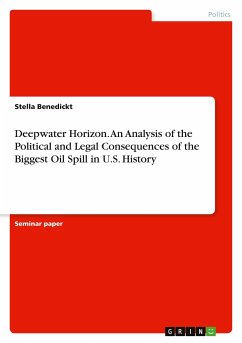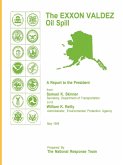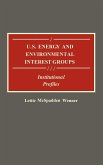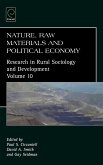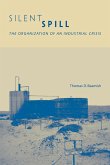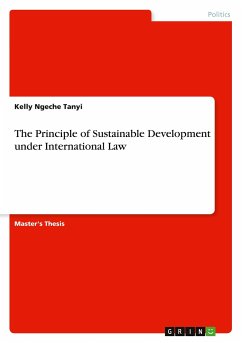Seminar paper from the year 2020 in the subject Politics - Environmental Policy, grade: 1,0, Christian-Albrechts-University of Kiel, language: English, abstract: This paper shortly explains the incident and it's environmental and economical consequences. However, the focus is on the political and legal changes that can be seen as a result of the accident. Who was held responsible for the spill? What was the direct response from the Obama Administration and how did the biggest oil spill in history changed policy concerning safety and oil production? For centuries the oceans are a source for food supply, transportation, security, oil and gas resources. At the same time, human pressure the oceans both from land and see and climate change causes further tension. Ocean governance developed as a response to this. It¿s the conduct of the policy, actions and affairs regarding the oceans and is engaged for example with the division of the ocean space and the diverging regulations to control human activity in the oceans. By the middle of the twentieth century there was an impetus to extend national claims over offshore resources. The exploitation fever grow as technology opens new ways to tap the resources of the sea. Especially oil exploration was moving further from land and deeper into the bedrock of continental margins in the late 1960s. The fast development of the offshore oil production needs to be seen in a political context as till the 1970s the United States had been the world¿s number one producer of petroleum and American oil companies determined the global price of oil. However, the American demand for oil steadily increased and so did the overall reliance on imports. The ¿oil shocks¿ in 1973 and 1979 were the clearest and most painful affirmation of the nation¿s vulnerability because of its dependence on import oil. The more oil the U.S. produces itself the more the country can limit its involvement with foreign powers and concentrate on entirely meeting its own energy needs. Offshore drilling and shale oil will provide that quantity of oil and any additional oil production can be used to trade internationally and thereby making the U.S more powerful on the global stage. Dependence on the other hand can threaten U.S. national security and revenues may undermine the efforts to promote good governance. The Gulf of Mexico is one of the most important regions for energy resources and infrastructure for the U.S., both onshore and offshore. One of the key events that caused the onset of major changes was the explosion at the Deepwater horizon mobile offshore drilling unit in the Gulf of Mexico on April 20,2010.

